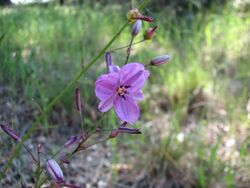Biology:Dichopogon strictus
| Dichopogon strictus | |
|---|---|

| |
| Scientific classification Error creating thumbnail: Unable to save thumbnail to destination
| |
| Kingdom: | Plantae |
| Clade: | Tracheophytes |
| Clade: | Angiosperms |
| Clade: | Monocots |
| Order: | Asparagales |
| Family: | Asparagaceae |
| Subfamily: | Lomandroideae |
| Genus: | Dichopogon |
| Species: | D. strictus
|
| Binomial name | |
| Dichopogon strictus (R.Br.) Baker[1]
| |
| Synonyms | |
| |
Dichopogon strictus (syn. Arthropodium strictum), commonly known as chocolate lily, is a herbaceous perennial plant species native to Australia.
Description
The species has up to 12 leaves that are linear or lanceolate in shape and are up to 65 cm long and 1–12 mm wide. The racemose inflorescence is up to 1 metre high. This appears between August and January in the species' native range.[2] The individual, drooping flowers range in colour from pale mauve to dark purple.[3] The common name chocolate lily alludes to the scent of the flowers which resembles chocolate, caramel or vanilla.[3][4]
The tubers, which are juicy and slightly bitter in taste, were eaten by Indigenous Australians.[3]
Taxonomy
The species was formally described in 1810 by Scottish botanist Robert Brown, based on plant material collected at Port Dalrymple in Tasmania.[5] Brown gave it the name Arthropodium strictum.[6] In 1876, English botanist John Gilbert Baker transferred it to the genus Dichopogon.[7] The name is treated as Dichopogon strictus in the World Checklist of Selected Plant Families and by the National Herbarium of New South Wales, while the name Arthropodium strictum is used in the Northern Territory, Queensland, South Australia, Victoria and Tasmania as well as in the 2006 Australian Plant Census.[6][8][9][10][11]
Cultivation
Plants prefer a well-drained situation with partial to full sun exposure. In drought conditions, plants may shrivel back to the tuber then resprout with autumn rains, whereas in situations where steady moisture levels are maintained in the soil, the summer flowering period will be extended. The species is suited to group plantings under trees or may be grown in containers.[12]
See also
- List of plants known as lily
References
- ↑ "Dichopogon strictus (R.Br.) Baker, J. Linn. Soc., Bot. 15: 319 (1876)", World Checklist of Selected Plant Families (The Board of Trustees of the Royal Botanic Gardens, Kew), http://apps.kew.org/wcsp/namedetail.do?name_id=304199, retrieved 7 March 2013
- ↑ "Dichopogon strictus (R.Br.) Baker". PlantNET - New South Wales Flora Online. Royal Botanic Gardens & Domain Trust, Sydney Australia. http://plantnet.rbgsyd.nsw.gov.au/cgi-bin/NSWfl.pl?page=nswfl&lvl=sp&name=Dichopogon~strictus. Retrieved 7 March 2013.
- ↑ 3.0 3.1 3.2 Low, T. (1991). Wild Food Plants Of Australia. Australia: Angus & Robertson. p. 105. ISBN 0207169306.
- ↑ "Arthropodium ". Pacific Bulb Society. http://www.pacificbulbsociety.org/pbswiki/index.php/Arthropodium. Retrieved 17 March 2013.
- ↑ "Dichopogon strictus". Flora of Australia Online. Department of the Environment and Heritage, Australian Government. http://www.anbg.gov.au/abrs/online-resources/flora/stddisplay.xsql?pnid=58122.
- ↑ 6.0 6.1 "Arthropodium strictum". Australian Plant Name Index (APNI), IBIS database. Centre for Plant Biodiversity Research, Australian Government, Canberra. http://www.anbg.gov.au/cgi-bin/apni?TAXON_NAME=Arthropodium+strictum. Retrieved 7 March 2013.
- ↑ "Dichopogon strictus". Australian Plant Name Index (APNI), IBIS database. Centre for Plant Biodiversity Research, Australian Government, Canberra. http://www.anbg.gov.au/cgi-bin/apni?TAXON_NAME=Dichopogon+strictus. Retrieved 7 March 2013.
- ↑ "Checklist of the Vascular Plants of the Northern Territory". Archived from the original on 28 March 2012. https://web.archive.org/web/20120328074336/http://www.nretas.nt.gov.au/__data/assets/pdf_file/0010/11017/200701nt_checklist.pdf. Retrieved 7 March 2013.
- ↑ "Census of the Queensland Flora - 2010 edition". http://www.ehp.qld.gov.au/plants/pdf/qld-flora-census.pdf. Retrieved 7 March 2013.
- ↑ "Census of South Australian Plants, Algae and Fungi". http://www.flora.sa.gov.au/census.shtml. Retrieved 7 March 2013.
- ↑ "A Census of the vascular plants of Tasmania - 2011 edition". http://www.tmag.tas.gov.au/__data/assets/pdf_file/0007/66796/Tasmanian_Vascular_Plant_Census_2011.pdf. Retrieved 7 March 2013.
- ↑ Plants of Melbourne's Western Plains: A Gardener's Guide to the Original Flora. Australian Plants Society, Keilor Plains Group. 2012. ISBN 978-0-909830-65-6.
Wikidata ☰ Q5272515 entry
 |

